Ehud - The Second Judge of Israel
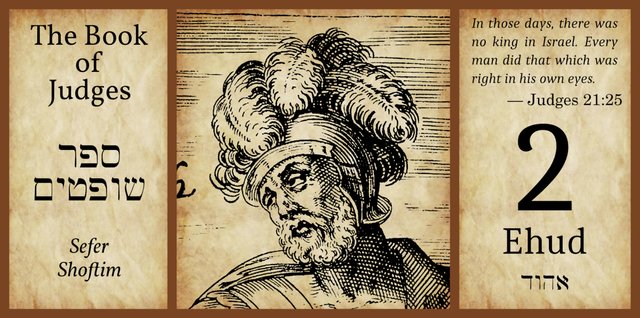
After the death of Othniel, Ehud ben-Gera became the second Judge of Israel:
And the children of Israel did evil again in the sight of the Lord: and the Lord strengthened Eglon the king of Moab against Israel, because they had done evil in the sight of the Lord. And he gathered unto him the children of Ammon and Amalek, and went and smote Israel, and possessed the city of palm trees. So the children of Israel served Eglon the king of Moab eighteen years.
But when the children of Israel cried unto the Lord, the Lord raised them up a deliverer, Ehud the son of Gera, a Benjamite, a man lefthanded: and by him the children of Israel sent a present unto Eglon the king of Moab. But Ehud made him a dagger which had two edges, of a cubit length; and he did gird it under his raiment upon his right thigh. And he brought the present unto Eglon king of Moab: and Eglon was a very fat man. And when he had made an end to offer the present, he sent away the people that bare the present. But he himself turned again from the quarries that were by Gilgal, and said, I have a secret errand unto thee, O king: who said, Keep silence. And all that stood by him went out from him.
And Ehud came unto him; and he was sitting in a summer parlour, which he had for himself alone. And Ehud said, I have a message from God unto thee. And he arose out of his seat. And Ehud put forth his left hand, and took the dagger from his right thigh, and thrust it into his belly: And the haft also went in after the blade; and the fat closed upon the blade, so that he could not draw the dagger out of his belly; and the dirt came out.
Then Ehud went forth through the porch, and shut the doors of the parlour upon him, and locked them. When he was gone out, his servants came; and when they saw that, behold, the doors of the parlour were locked, they said, Surely he covereth his feet in his summer chamber. And they tarried till they were ashamed: and, behold, he opened not the doors of the parlour; therefore they took a key, and opened them: and, behold, their lord was fallen down dead on the earth.
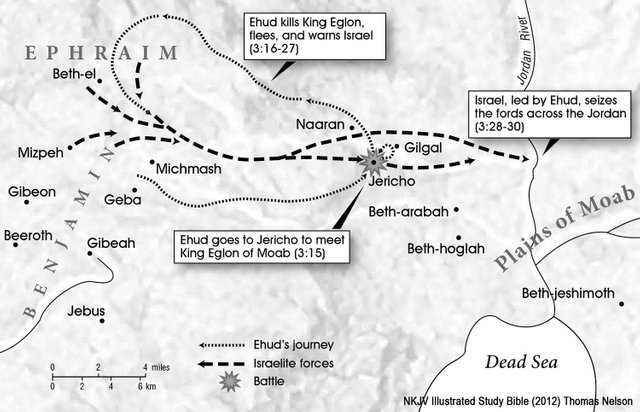
And Ehud escaped while they tarried, and passed beyond the quarries, and escaped unto Seirath. And it came to pass, when he was come, that he blew a trumpet in the mountain of Ephraim, and the children of Israel went down with him from the mount, and he before them.
And he said unto them, Follow after me: for the Lord hath delivered your enemies the Moabites into your hand. And they went down after him, and took the fords of Jordan toward Moab, and suffered not a man to pass over. And they slew of Moab at that time about ten thousand men, all lusty, and all men of valour; and there escaped not a man.
So Moab was subdued that day under the hand of Israel. And the land had rest fourscore years. (Judges 3:12-30)
Eglon is not known from any other ancient sources.
The City of Palms is Jericho.
The present which Ehud is commissioned to deliver to him is identified in the original Hebrew as a payment of tribute.
The quarries near Gilgal where Ehud turns back are graven images or stone idols. The Hebrew name for Gilgal is thought to mean “stone circle.”
The phrase “covereth his feet” is a common Biblical euphemism for “is defecating”.
Seirah is an unidentified place in the hill country of Ephraim (Berlin & Brettler 517).
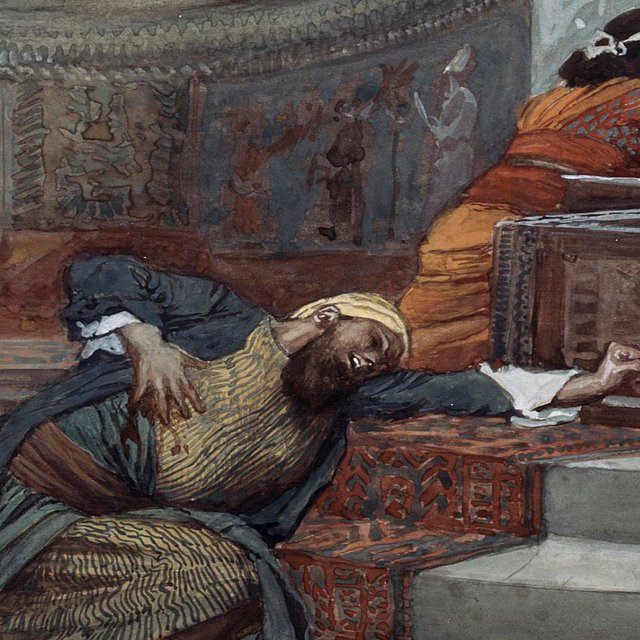
This is a peculiar story, with many striking—if not downright bizarre—features. There appears to have been a deliberate attempt to humiliate Eglon:
He is described as being “a very fat man.” He is, in fact, so fat that when he is stabbed, the fat engulfs the sword and Ehud cannot pull it out. His name Eglon is said to suggest both “bovine” and “rotund”, being close in sound to Hebrew words for “cow” and “round” (Freedman 2225, 3759 : Strong 85).
He was stabbed in the “belly.” The Hebrew word for belly is בְּבִטְנֽוֹ (beten), which is the same word for a woman’s womb. Eglon is possibly being feminized, or he was simply so fat he resembled a heavily pregnant woman. Another Hebrew word, מעה [m‛h], is used to denote the belly of the fish in the Book of Jonah (Jonah 2:1-2).
An obscure phrase says that when Eglon was stabbed, “the dirt came out,” which may mean that he soiled himself. Young’s Literal Translation gives: “And [the blade] goeth out at the fundament,” which is also far from flattering.
The assassination took place in Eglon’s summer parlour, or “upper chamber of the wall” in Young’s Literal Translation. The fact that Eglon’s servants thought that he was relieving himself implies that this was actually a latrine: Eglon was murdered when he was at stool.
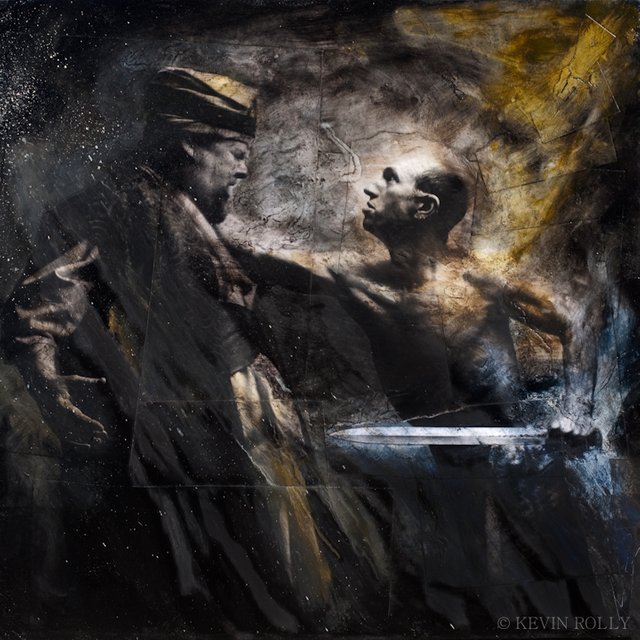
Why did Ehud leave, only to turn back when he was in the vicinity of Gilgal? The location of Gilgal is still uncertain, but it lay to the west of the River Jordan, possibly close to Jericho. The Kingdom of Moab, on the other hand, lay on the other side of the Jordan, to the east of the Dead Sea. The principal city of Moab—and possibly its capital in the Late Bronze Age—was Dibon, which lies about 20 km from the eastern shore of the Dead Sea. If this is the setting for Judges 3, then Ehud must have travelled at least 50 km before turning back. Perhaps it was necessary for him to carry out some ritual of purification at Gilgal before he could assassinate Eglon. In Josephus’s account in the Jewish Antiquities, Ehud assassinates Eglon during his first and only visit. There are other significant differences between Josephus’s account and the Biblical one, which suggests that Josephus was drawing upon a different source.
Another Moabite stronghold, Madaba, has also been suggested as the location (Freedman 2224). But was the assassination of Eglon set in Moab? Another interpretation is that Ehud delivered the tribute to Eglon in Jericho (Freedman 2224, 2358). Judges 3:13 tells us that Eglon captured the “City of Palms,” which is generally identified as Jericho, as in Deuteronomy 34:3. The detail, then, of Ehud doubling back could confirm that Gilgal lay in the vicinity of Jericho.
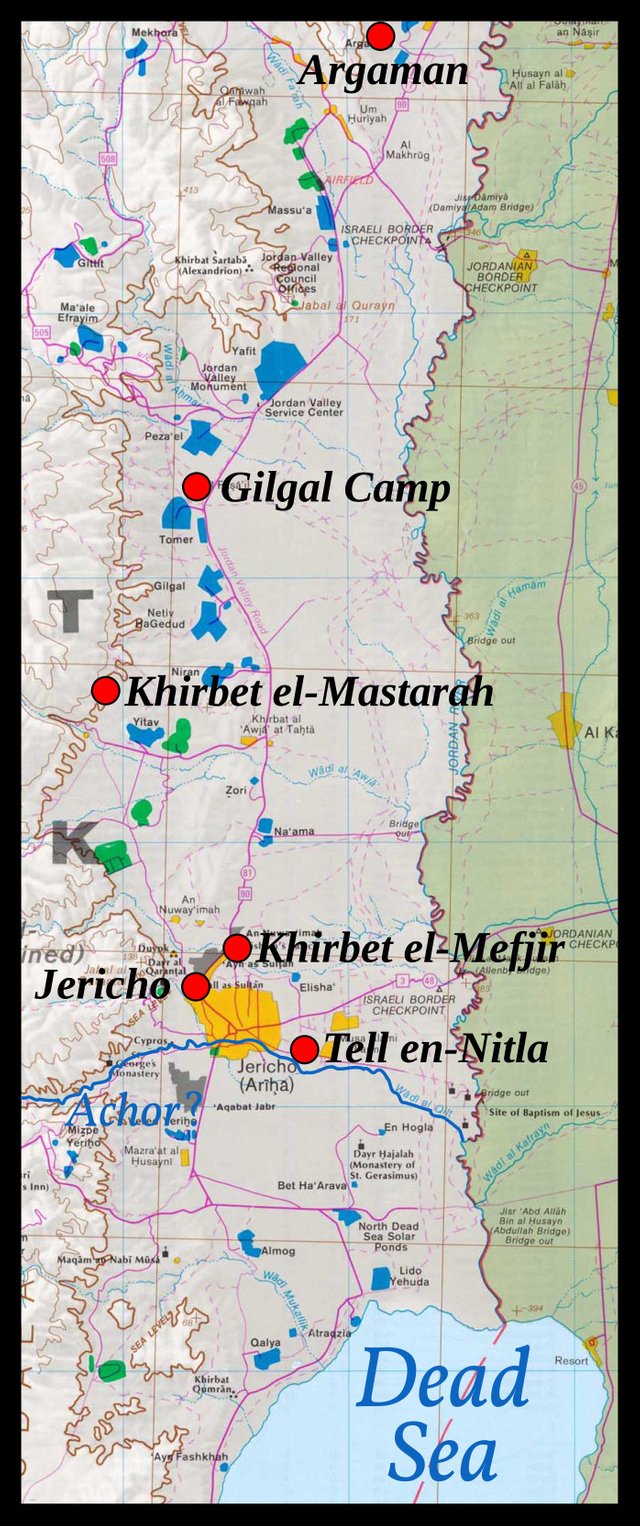
Ehud’s left-handedness is another peculiarity of the story. Ehud is a left-handed Benjaminite. As we saw in an earlier article, the story of The Levite and His Concubine in Judges 20 mentions 700 left-handed Benjaminites, who wield the sling in battle. Their left-handedness is described using the same phrase as Judges 3:15: “shut of his right hand”. This suggests that the phrase is not meant to imply any physical impairment, but is simply a way of expressing left-handedness. Benjamin is traditionally interpreted as meaning “son of my right hand”.
Another puzzling element of the story is the word מסדרון [misdĕrôn] in 3:23, which appears to describe the route Ehud took to escape from Eglon’s chamber while leaving the main door locked. This word is a hapax legomen—this is its only occurrence anywhere in the Bible—and various translations have been suggested. Curiously, Ehud is said to have gone out before shutting the door and bolting it behind him. The Hebrew literally means that he fastened the doors with a bar or cord. Why, then, did Eglon’s servants think their master was relieving himself? Could they not see that the door had been locked from the outside? And to further confuse the issue, when they do eventually open the doors, they use a key (מפתח [mptḥ]).
Perhaps the simplest explanation of these inconsistencies and lexical oddities is that offered by Michael D Coogan of Harvard Divinity School:
Modern scholars consider [Judges] to be the work of the Deuteronomistic Historians ... The Deuteronomistic Historians incorporated a variety of previously existing sources into their narrative of life in early Israel ... Folk legends of originally local heroes (the “judges”) ... (Coogan 177 ... 178)
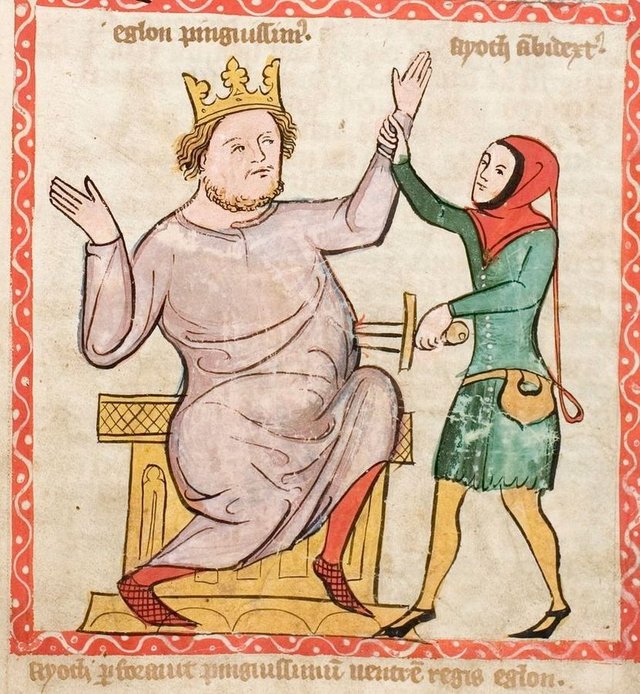
As we have seen, Josephus’s version of the tale differs in several details from the Biblical version, implying that the story was not concocted by the authors of Judges. George A Barton, Associate Professor in Biblical Literature and Semitic Languages at Bryn Mawr College in Pennsylvania and a contributor to The Jewish Encyclopedia, also believes that there is some historical basis to the tale:
The story of Ehud was taken from one of the oldest sources of the Book of Judges, into which it had possibly been put after having passed from mouth to mouth as a folk-tale. The beginning of the tale has been displaced by the pragmatic introduction of the author of Judges ... The author of Judges has taken the narrative of a local incident and transformed it into a deliverance of all Israel. The story is not quite homogeneous ... Recent critics accept Ehud as a historical character. (Singer 75)
Ehud’s tale, then, may be a local legend that was adapted—somewhat crudely—to fit the cyclical pattern of the Book of Judges. According to this pattern: Israel repeatedly relapsed into idolatry, and was subsequently punished with servitude to a foreign invader, before being delivered by a heroic Judge sent by Yahweh, only to relapse once again after a period of rest.
Comic Relief
A common interpretation of the story of Ehud and Eglon, one which by its very nature casts doubt on its historicity, regards it as comic relief in an otherwise serious book of the Bible:
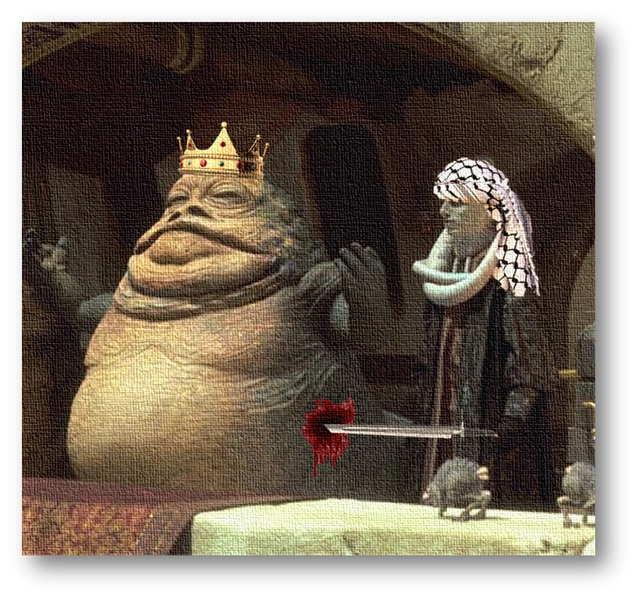
Consider, for example, one of the Bible’s few extended comical scenes, the Israelite judge Ehud’s slaying of the Moabite king Eglon in Judg 3:15–30. Ehud exploits his abnormality, left-handedness, to trick the Moabite and stab him. Eglon, whose name suggests both “bovine” and “rotund,” is described as “very fat” (v 17), a visually comic image. Ehud’s dagger punctures the obese king blade, hilt, and all (v 22). In a moment of rare scatological humor in the Bible, the fatal blow causes Eglon’s bowels to loosen, which, in a sense of high dramatic irony, allows Ehud to escape while the Moabite guards wait around judging by the odor that their king is relieving himself (vv 24–26). Ehud magnifies the comedy through verbal wit as well. In v 19 he tells Eglon he has a “word” (Heb dābār, “word, thing”) for him—the dagger, of course. The pun involves another wordplay: the Heb expression for the weapon’s two “edges” has the basic meaning of “mouths” (v 16; cf. Good 1965:33). The dagger’s “mouths” surely have a “word” to say to the king. The double entendre embodies the joke.
The scene vents hostility toward Moab through its satire of the royal court and its flawed security, and Ehud’s role as deft trickster (cf.Niditch1987) would no doubt entertain an Israelite audience. (Freedman 3759)
Conclusion
It is possible that Ehud, like his predecessor Othniel, was not an historical figure. If, however, his story is based on actual events, those events were probably only of local consequence in the territories of the Tribes of Benjamin and Ephraim. The story may even date back to the time of the Canaanites, before Joshua’s Conquest. But this is all speculation.
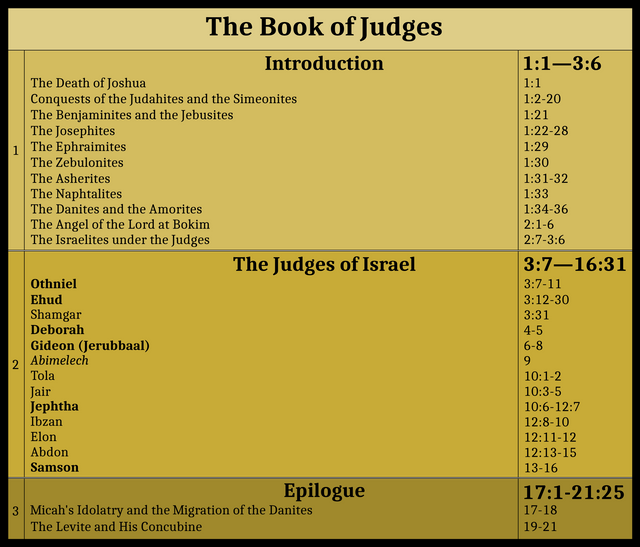
And that’s a good place to stop.
References
- Adele Berlin & Marc Zvi Brettler (editors), The Jewish Study Bible, Jewish Publication Society TANAKH Translation, Oxford University Press, Oxford (1999)
- Michael David Coogan, A Brief Introduction to the Old Testament: The Hebrew Bible in Its Context, Second Edition, Oxford University Press, Oxford (2012)
- David N Freedman (editor), The Anchor Yale Bible Dictionary, Doubleday, New York (1992)
- Isidore Singer (managing editor), The Jewish Encyclopedia, Volume 5, Funk & Wagnalls Co, New York (1904)
Image Credits
- Ehud: Jan Collaert the Elder (engraver), Jan Snellinck (designer), Gerard de Jode (publisher), The Twelve Judges of Israel, Rijksmuseum Amsterdam, Public Domain
- Map of Ehud’s Campaign: © Thomas Nelson, NKJV Illustrated Study Bible, Thomas Nelson Publishers, Nashville, TN (2012), Fair Use
- Eglon Slain by Ehud: James Jacques Joseph Tissot (artist), Jewish Museum, New York, Public Domain
- The Sword of Ehud: © Kevin Rolly (artist), Fair Use
- Candidate Locations for Gilgal: West Bank and Vicinity, Central Intelligence Agency, Perry-Castañeda Library Map Collection, The University of Texas at Austin, Public Domain
- Ehud Kills Eglon: Speculum Humanae Salvationis, Folio 55r (cropped), Universitäts- und Landesbibliothek Darmstadt, Darmstadt, Public Domain
- Jabba the Hutt and Bib Fortuna as Eglon and Ehud: Screenshot (altered) from The Phantom Menace, © Lucasfilm Ltd, Fair Use
